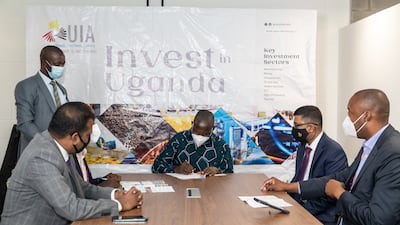It is not often that Uganda makes headlines across the Gulf. But as the first participant at Expo 2020 Dubai to announce a raft of new investments – spanning some $650 million in deals signed across a range of sectors – that was exactly what the East African country did.
And yet, Uganda's strong presence at the Expo, which included President Yoweri Museveni and various Cabinet ministers, was to be expected. Indeed, it is just the latest step in the country's aggressive efforts to boost relations and trade with the UAE and other GCC member states. Those efforts have been fruitful: since diplomatic relations were established in 2009, Ugandan exports to the UAE have grown, from $300m in the early years to $1.85 billion in 2020. Today, the UAE is Uganda's largest trading partner in the region.
Continuing to build upon this relationship is crucial to Uganda's strategy to industrialise its economy, shifting the focus from low-value agriculture to value-added manufacturing. Now, as it begins to turn its attention to economic recovery from the most severe global health crisis in living memory, that relationship offers it a platform to fast-track its industrialisation agenda, which had been slowed down by the pandemic.
As the largest segment of Uganda's economy, the agriculture sector is an obvious area for investment both from and in partnership with GCC markets, particularly as the country seeks to shift towards agro-processing. The pandemic has highlighted food security pressures in the GCC, which imports about 85 per cent of its food. Moreover, it is one of the world's fastest-growing markets for fast-moving consumer goods, with food consumption expected to grow to 60.7 million metric tonnes by 2023.
Like much of Africa, the GCC is fast developing an increasingly affluent, demanding and health-conscious middle class, who seek natural sources of organic foods to support their modern lifestyle. Uganda, meanwhile, is a leading producer of fresh fruits and vegetables – some 5.8 million tonnes annually – mainly grown by small-holder farmers whose income is expected to rise tremendously with these new deals. One such deal closed at the Expo will see UAE agriculture company Elite Agro construct a tea factory in Uganda. And with Saudi Arabia now the fastest-growing coffee market in the Middle East, Ugandan Foreign Minister Gen Jeje Odongo oversaw on the sidelines of the Expo the launch of the first Uganda-Saudi forum aimed at boosting Ugandan coffee exports to the kingdom.
Clean energy presents another clear area for synergy and collaboration. Uganda is an African leader in manufacturing electric and clean vehicles, such as Kiira Motors’ solar-powered bus – the first in Africa – and Bodawerk's electric ambulance – a business created by a young and innovative crop of Ugandans in partnership with the government. The UAE, meanwhile, is fast emerging as the world leader in blue and green hydrogen production from carbon capture. At the Expo, we were pleased to see UAE companies such as Connect LLC commit to investing more than $500m in renewable energy projects that will include electricity generation, smart energy storage and innovative new means of public transport.

Tourism is another key sector Uganda is hoping to boost with the UAE, especially in the aftermath of the pandemic. The first week of the Expo coincided with Uganda Airlines' maiden flight to Dubai. This is expected to also facilitate trade across a number of other sectors, such as mining.
All that said, the recently signed $650m worth of deals are just a fraction of Uganda's broader ambition to secure $4bn in investments to drive forward its post-Covid-19 economic recovery. As well as the export of meat and dairy products, grain, fruit and vegetables, the government is working on partnership deals to assemble computers, laptops and phones. And as it bolsters its presence in GCC markets, the region's location at the nexus of the world opens doors to other markets, too, such as China and the Far East.
But Uganda's relationship with its GCC partners promises to go well beyond that, driving growth for both parties as it continues its vertiginous trajectory up the manufacturing value chain. East Africa boasts one of the world's fastest-growing and youngest economies (77 per cent of Ugandans are 25 years old or younger). Uganda prides itself as that region's security hub, leading peacekeeping and supporting peacemaking efforts with and for its neighbours, protecting and bolstering a fast-growing yet sometimes volatile regional economy. Sitting at an important regional crossroads, Uganda seeks to position itself as the region's manufacturing and trade hub, too.
Happily, the feeling is mutual, with the UAE undertaking a diplomatic outreach in East Africa in recent times, with a particular focus on Uganda. Abdalla Hassan Al Shamsi, the UAE's ambassador to Uganda, arrived in Kampala in March and, since July, has held back-to-back meetings with the government.
Next year, it will be Uganda's turn to host a high-level delegation from the UAE. Those discussions will follow up on the various deals signed at the Expo, and explore how a young, up-and-coming East Africa and an increasingly affluent GCC can further strengthen co-operation and collaboration in fields of mutual benefit, forging a path to shared prosperity.


